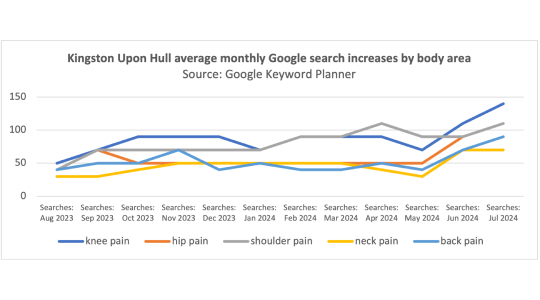The UK's sorest cities
Find out the truth about which city in the UK has the most aches and pains, from our expert, Dr Damian McClelland.

Your health expert:
Damian McClelland, MSK Clinical Director,
Bupa UK Insurance
Publish date 21/02/2025.
Next review 21/02/2026.
Damian McClelland shares useful advice to help tackle the nation’s most common aches and pains, as we rank the sorest cities across the UK.
Which UK cities struggle the most with muscular pain?
We've researched the search habits of 28 cities across the UK to find out who's struggling most with bone and muscular pain.
Our findings show the nation frequently turns to Google for help with muscle and body pain. Research also revealed some cities appear to be struggling with pain more than others.
These cities made the most Google searches for bodily pain, against their populations†. This suggests that there’s a higher concentration of people in pain, in each of these places.
The top 10 sorest cities in the UK:
- 1. Brighton
- 2. Plymouth
- 3. Chester
- 4. Portsmouth
- 5. Bristol
- 6. Aberdeen
- 7. Wolverhampton
- 8. Leicester
- 9. Bradford
- 10. Belfast
We also found differences in how cities have been searching for help with pain that affects specific parts of the body.
Here, we show the top 10 searches for knee pain, shoulder pain, back pain, hip pain and neck pain.
The top 10 UK cities struggling with knee pain:
- Brighton
- Chester
- Plymouth
- Aberdeen
- Portsmouth
- Wolverhampton
- Bristol
- Leeds
- Bradford
- Leicester
The top 10 UK cities struggling with back pain:
- Plymouth
- Brighton
- Aberdeen
- Chester
- Portsmouth
- Leeds
- Wolverhampton
- Belfast
- Bristol
- Bradford
The top 10 UK cities struggling with shoulder pain:
- Brighton
- Chester
- Plymouth
- Stoke
- Portsmouth
- Wolverhampton
- Derby
- Bristol
- Aberdeen
- Hull
The top 10 UK cities struggling with hip pain:
- Chester
- Stoke
- Brighton
- Plymouth
- Portsmouth
- Aberdeen
- Leeds
- Bristol
- Wolverhampton
- Sheffield
The top 10 UK cities struggling with neck pain:
- Portsmouth
- Brighton
- Chester
- Bristol
- Plymouth
- Wolverhampton
- Leeds
- Aberdeen
- Leicester
- Bradford
Sorest cities research findings
Cities in the most pain
Brighton, Chester, Plymouth and Portsmouth are in the top 5 cities for all pain types.
Specific pains
The cities that have a lot of pain in one area are likely to be searching for pain relating to other specific areas as well.
Country-wide problem
There is no clear region of the UK that suffers with pain, over another, suggesting it’s a country-wide problem.
MSK in Brighton
Our research shows that musculoskeletal (MSK) pain is a significant issue in many areas. Brighton, and other coastal cities like Portsmouth, Aberdeen and Plymouth seem to be particularly affected. There are several factors that may be contributing to this:
Demographics
Brighton has a relatively high proportion of older adults.
Older adults are more likely to suffer from MSK conditions like arthritis and chronic back pain.
Lifestyle factors
Physical inactivity can exacerbate MSK conditions.
Like many urban areas, Brighton may have residents where this lifestyle factor is far more common.
Healthcare access
Variations in healthcare access can impact how well MSK conditions are managed.
If there are barriers to accessing treatment in a certain area, people may report more pain.
Damian McClelland says:
“Research shows that there are UK cities in pain across multiple areas of the body. Brighton takes the top spot for most pain types, suggesting every seven in 25 people is in some kind of pain.
“Some cities showed up frequently throughout our research, but other cities only appear to struggle with certain types of pain. For example, Belfast appears to suffer with back pain; Sheffield is a city where more have hip pain, and Derby and Hull have more shoulder pain.
“Body pain is common for certain chronic conditions, like fibromyalgia. It can also be brought on if you’ve been overusing your muscles, or if you have poor posture or tension.
“Our research shows that plenty of us are regularly experiencing pain. Looking for quick solutions to that pain is understandable, especially if you’re struggling to sleep, work or do your daily tasks because of it. However, identifying the root cause of the pain is the first step to treating it and – most importantly – not making it any worse.”
Sore city under the spotlight: Hull
We’ve also uncovered some interesting search increases in Kingston Upon Hull.
Google search volume data from August 2023 to July 2024 shows searches within the city increased significantly for all types of body pain. In particular, the data shows:
‘Hip pain’ searches tripled
‘Knee pain’ searches tripled
‘Shoulder pain’ searches tripled
‘Neck pain’ searches doubled
‘Back pain’ searches doubled
It’s difficult to say for sure what’s causing the vast search increases across Hull, but there could be several contributing factors.
We know that there there’s a higher-than-average number of workers in Hull with jobs that involve physical activity. Most of these pain related terms saw search increases during summer 2024.
Could it be that workers have been overusing muscles when their colleagues have been on annual leave, and are in pain as a result?
Another possibility is that more people in Hull have been taking up new exercise regimes. Overuse of muscles, along with poor form and technique, can lead to pain.
Drinking too little water can also lead to muscular pain, which may explain why the search increases were starker during the summer.

Referred pain
If you have pain in your muscles, bones or joints, the cause might be obvious. Especially if you’ve recently overexerted yourself, slept funny, or injured yourself.

Often, these kinds of pain are short-lived, and can go away by themselves, or using self-help measures like the POLICE method and over-the-counter painkillers.
However, some body pains don’t always have a clear cause. If this sounds like your pain, it’s really important to speak to a health professional, especially if the pain doesn’t subside after three months. Or if the pain affects your breathing, or stops you from carrying out daily tasks.
Some body pains may be caused by a health concern in another area of your body. This is known as referred pain. In fact, shoulder and back pain are two areas more prone to being affected by referred pain.
Referred back pain may be caused by several health issues, including gallstones and kidney issues. Referred shoulder pain could be a sign that you have issues with your lungs, liver or heart.
These are just some of the health concerns that referred pain may be connected to. Always speak to a health professional to discuss your symptoms, and to define whether you need specific treatment.
A final word from Damian McClelland
“If a certain part of your body starts hurting, but you can cope with it, the first thing to do is to try pain relief techniques at home. This involves managing the pain until it eases, such as applying heat or ice packs to the affected area, over-the-counter painkillers, and keeping mobile.
“Pain that lasts for more than a few weeks need checking out. Speak to a health professional, who might suggest physiotherapy, or further tests or treatment. If you have health insurance, you might even be able to get physiotherapy without having to speak to a GP first.”
† Methodology: Using Google Keyword Planner, we combined the average monthly search volumes for knee pain, shoulder pain, back pain, hip pain and neck pain, for 28 cities across the UK. This combined value was divided by Google Keyword Planner’s ‘city reach’ for each of the mentioned cities to work out the percentage of searches, per population. 28 cities used in research: Aberdeen, Belfast, Birmingham, Bradford, Brighton, Bristol, Cardiff, Chester, Coventry, Derby, Edinburgh, Glasgow, Hull, Leeds, Leicester, Liverpool, London, Luton, Manchester, Newcastle, Nottingham, Plymouth, Portsmouth, Sheffield, Southampton, Stoke, Sunderland, Wolverhampton.


